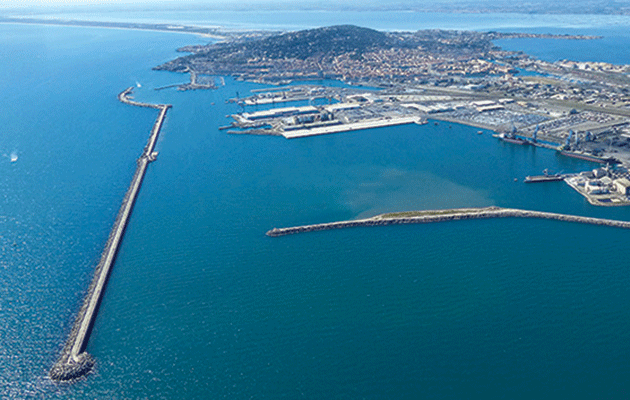From Nice to Marseille, Lu Heikell of Yachting Monthly gives you a guide to cruising the coastline of the French Riviera
In partnership with The Platinum Card® from American Express®
The south of France has a relatively short coastline, some 350 or 400 nautical miles (560km-640km) depending how many bumps and bays you measure. It also has a roll call of familiar names, along with a sense of the exotic resorts ‘discovered’ by writers and artists in the early 20th Century. The longest passage you have to make is 30nm (48km) around the mouth of the Rhône, but most hops can be much shorter.
Collioure
Close to the Spanish border and on the edge of the Pyrenees lies Collioure. It became an artists’ colony and the list of names who came here reads like a who’s who of modernism and other leading art movements: Henri Matisse, Raoul Dufy, Juan Gris. At the Hotel des Templiers (www.hotel-templiers.com) the owner at the time accepted paintings as payment for board and lodgings and consequently there’s a superb selection of 20th-Century art on display here.
From seawards, the château makes it easy to pinpoint the bay. Once around the Presqu’île St-Vincent, pick up one of the mooring buoys in this pretty, clover-leaf bay and contemplate what might be on the menu at the Restaurant des Templiers, where the wines include characterful local bottles from producers in Collioure and the Côtes du Roussillon.
Sète
In the heart of the Gulf of Lion, where the Canal du Midi reaches the Mediterranean and the Tramontane wind howls, Sète is very much a working harbour. The town is built around the Canal du Rhône à Sete and everywhere you walk there are watery vistas. It is tempting to make comparisons, but Sète is not a little Venice – it is less formal, more workaday, less ostentatious.
Berth in the Vieux Bassin near the sea, or in Bassin du Midi near the canal. There are super-yacht berths in the Nouveau Bassin too. Then wander down to the restaurants nearest the fishing boats for oysters from the Etang du Thau washed down with a fresh glass of local Picpoul de Pinet.

Marseille
Nowadays Marseille is the new cultural capital of the south, supplanting its old rival Aix-en-Provence. The Fort St-Jean dominates the north side of the harbour and is a useful landmark. Head into one of the yacht clubs’ pontoons on the south side of the Vieux Port and you are right in the heart of the old city.
Marseille is the home of the Provençal fish stew bouillabaisse, and Chez Madie les Galinettes (www.madielesgalinettes.com) on the north side of the harbour is as good a place as any to sample the local speciality, paired with a crisp glass of Provence rosé. You are also just a short sail from the Iles du Frioul and the Château d’If, setting of The Count of Monte Cristo by Alexandre Dumas
Promotion
The Platinum Card ® from American Express ® offers worldwide travel insurance that covers you, your partner, your dependent children and your Supplementary Cardmembers. This comprehensive cover includes skiing, scuba diving and gap-year cover for children under 25, giving you support that offers peace of mind as you, or they, embark on that next adventure.
For more information and to apply for The Platinum Card click here.
Annual Fee £450. Terms and Conditions apply.
IMPORTANT INFORMATION
Important Information:
If you’d prefer a Card without any rewards, other features or a Cardmembership fee, an alternative is available – the Basic Card. Applicants must be 18 or over. Approval is subject to status and Terms and Conditions apply.
Terms and Conditions apply. Full details of the travel protection benefits currently available can be found in the Terms and Conditions at americanexpress.co.uk/PlatinumInsurance
Promoter: American Express Services Europe Limited is authorised and regulated by the Financial Conduct Authority.
St-Raphaël
The Côte d’Azur includes many of the places commonly associated with the south of France. Names such as Cannes, Antibes, Juan-les-Pins and St-Tropez trip off the tongue in a familiar recital of well-known resorts. Along this coast the weather is more moderate than to the west. The Mistral is less strong and not as frequent, and the sea breeze blowing from the southeast is the prevalent summer wind. There are a number of small bays suitable for lazy lunch stops or fine weather over-nighters.
St-Raphaël Vieux Port has recently had something of a makeover, from slightly shabby old fishing port to something shinier and more spacious. It still has a few fishing boats and the fish market though. You will need to book ahead here, even in mid-season, to guarantee a berth. It may be sacrilege to suggest, but there is a very good Danish restaurant, Olsen Butik (www.olsenbutik.fr), in the back streets, which marries Scandi-style fish with a choice of reasonably priced, seafood-friendly whites and rosés from across France including Sancerre, Chablis and Pouilly-Fuissé.
Nice
The capital of the Riviera and considered by many to be the queen of the coast – the classiest resort of them all. This is where the Alps run down to the sea and shelter the coast from the worst effects of winter, giving it a mild climate all year round without extremes of hot or cold.
Again, you will moor up in the centre of the city and again you will need to book ahead. Le Marlin (www. lemarlin.fr), just across the road from the pontoons, is a small family-run restaurant where you can keep an eye on your pride and joy as you people-watch and enjoy beautifully presented seafood dishes paired with regional French wines.

About the author
Lu Heikell is co-author of the sixth edition of Mediterranean France and Corsica Pilot (Imray, £45), the essential companion to cruising this coastline




